
Filomat
Scope & Guideline
Fostering Collaboration in Mathematical Research
Introduction
Aims and Scopes
- Mathematical Analysis:
Research in this area involves the study of limits, continuity, differentiation, integration, and infinite series, providing a foundational framework for understanding more complex mathematical structures. - Algebra and Its Applications:
This includes the study of algebraic structures such as groups, rings, fields, and modules, as well as their applications in solving equations and modeling real-world phenomena. - Functional Analysis:
Exploration of vector spaces and operators, focusing on properties of functions and functionals, often with applications in differential equations and quantum mechanics. - Differential Equations:
A significant focus on both ordinary and partial differential equations, including their theoretical aspects and numerical solutions. - Numerical Methods and Approximations:
Development of algorithms and techniques for numerical analysis, including approximation theory, interpolation, and numerical solutions to mathematical problems. - Graph Theory and Combinatorics:
Research on the properties and applications of graphs, including their mathematical foundations and implications in various scientific fields. - Topology and Geometry:
Studies that encompass both algebraic and geometric topology, exploring properties of spaces and their transformations. - Fuzzy Logic and Soft Sets:
Research involving fuzzy set theories and their applications in decision-making processes, data analysis, and uncertainty modeling.
Trending and Emerging
- Fractional Calculus:
An increasing number of papers focus on fractional differential equations and their applications, reflecting a growing interest in non-integer order derivatives which have implications in various fields including physics and engineering. - Machine Learning and Data Science Applications:
There is a noticeable rise in research that integrates mathematical theories with machine learning algorithms, statistical models, and data analysis techniques, showcasing the interdisciplinary nature of current mathematical research. - Complex Systems and Dynamical Systems:
Emerging studies on complex systems, including chaos theory and dynamical systems, are gaining popularity as researchers seek to understand intricate behavior in various scientific contexts. - Topological Data Analysis:
This area is becoming increasingly relevant, with a focus on using topology to analyze data structures, which is particularly useful in fields like neuroscience and materials science. - Optimization Problems:
Research on various optimization techniques, especially in fractional and stochastic contexts, is trending as applications in economics, engineering, and operational research grow.
Declining or Waning
- Classical Mathematical Physics:
Research that primarily focuses on classical physics applications in mathematics has seen a decline, possibly due to a shift towards quantum and relativistic studies which offer more contemporary relevance. - Elementary Number Theory:
Papers focusing on fundamental aspects of number theory have decreased, as researchers increasingly explore more complex areas such as algebraic number theory and computational methods. - Traditional Statistical Methods:
The publication of papers solely dedicated to classical statistical methods has waned, with a growing emphasis on modern statistical learning, machine learning, and data science methodologies.
Similar Journals

Bulletin of the Iranian Mathematical Society
Empowering researchers to share groundbreaking mathematical insights.The Bulletin of the Iranian Mathematical Society, published by SPRINGER SINGAPORE PTE LTD, is a distinguished journal dedicated to advancing the field of mathematics. With an ISSN of 1017-060X and E-ISSN 1735-8515, this journal has established a valuable platform for researchers and scholars to disseminate their findings from 2008 to 2024. The journal is categorized in the Q2 tier of Mathematics (miscellaneous) for 2023, showcasing its importance and relevance in the mathematical community, ranked #169 out of 399 in General Mathematics with a 57th percentile standing in Scopus. While currently operating under a subscription model, it remains an essential resource for professionals and students seeking cutting-edge research and developments in various domains of mathematics. The Bulletin aims to bridge theoretical research and practical application, thereby enriching both academia and industry.
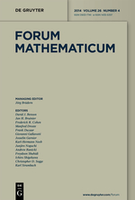
FORUM MATHEMATICUM
Fostering Knowledge: Your Gateway to Mathematical MasteryFORUM MATHEMATICUM, published by WALTER DE GRUYTER GMBH, is a distinguished academic journal based in Germany, known for its significant contributions to the field of mathematics. With an ISSN of 0933-7741 and an E-ISSN of 1435-5337, the journal features comprehensive studies ranging from applied mathematics to diverse mathematical disciplines. Having maintained a commendable presence since 1989, FORUM MATHEMATICUM has achieved notable classification rankings, including Q2 in Applied Mathematics and Q1 in miscellaneous Mathematics as of 2023. Additionally, it holds a Scopus rank within the top 60th percentile in General Mathematics, making it a prominent platform for researchers and professionals seeking rigorous analysis and innovative methodologies in mathematics. While the journal does not currently offer open access, its rich content is pivotal for advancing mathematical theory and applications, appealing to students and seasoned academics alike.
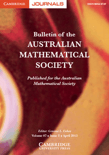
BULLETIN OF THE AUSTRALIAN MATHEMATICAL SOCIETY
Illuminating Mathematical Innovations for GenerationsBULLETIN OF THE AUSTRALIAN MATHEMATICAL SOCIETY is an esteemed journal dedicated to advancing the field of mathematics, published by Cambridge University Press. Since its inception in 1969, this periodical has fostered scholarly communication and showcased pivotal research in various domains of mathematics, now projected to continue until 2024. With an impact factor that places it in the Q2 category of miscellaneous mathematics research, it holds a notable position among its peers, ranking 215th out of 399 in the Scopus database. Though it does not currently offer open access options, the journal remains a vital resource for researchers, professionals, and students seeking to deepen their understanding of mathematical advancements. The Bulletin serves as a crucial platform for disseminating original research, comprehensive reviews, and insightful perspectives that navigate the complexities of mathematics today, ensuring the community is well-informed and engaged.
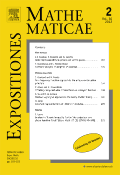
EXPOSITIONES MATHEMATICAE
Connecting Scholars Through Mathematical InsightsEXPOSITIONES MATHEMATICAE, published by Elsevier GmbH, stands as a significant journal in the realm of mathematics, catering primarily to researchers, professionals, and students. With an ISSN of 0723-0869 and an E-ISSN of 1878-0792, this journal has made its mark in the academic community, boasting a Q2 classification in the miscellaneous mathematics category for 2023, illustrating its prominence within its field. The journal addresses a diverse scope of mathematical topics, encouraging the publication of original research and innovative theories while maintaining rigorous academic standards. As it converges from 2004 to 2024, EXPOSITIONES MATHEMATICAE continues to be an essential resource for advancing mathematical knowledge and fostering scholarly communication, despite being a non-open-access publication. Its location in Munich, Germany further anchors it within a rich intellectual tradition, providing accessibility for the mathematical community worldwide.

Kyungpook Mathematical Journal
Showcasing Excellence in Applied and Miscellaneous MathematicsWelcome to the Kyungpook Mathematical Journal, a prominent publication dedicated to the advancement of mathematical research across various fields, including applied mathematics and miscellaneous mathematical disciplines. Published by the Department of Mathematics at Kyungpook National University in South Korea, this journal aims to disseminate high-quality original articles, fostering a deeper understanding and innovative applications of mathematical theories. With a distinguished Scopus ranking in its category, standing at Q3 in Applied Mathematics and Q3 in Mathematics (miscellaneous), it serves as a crucial platform for both emerging and renowned scholars to share their findings with a global audience. This publication is indexed in reliable databases, ensuring enhanced visibility and impact for its contributors. Even though it currently lacks open-access distribution, the journal remains an essential resource for researchers, professionals, and students looking to stay at the forefront of mathematical exploration from 2007 to 2024 and beyond. Join us in contributing to the vibrant discourse that shapes the future of mathematics.

European Journal of Mathematics
Fostering Innovation in MathematicsWelcome to the European Journal of Mathematics, a prominent publication that serves as a vital platform for disseminating high-quality research in the field of mathematics. Published by Springer International Publishing AG, this journal has witnessed significant growth since its inception in 2015 and is recognized for its contributions within the Q2 category of Mathematics (miscellaneous) as per the 2023 rankings. With an ISSN of 2199-675X and an E-ISSN of 2199-6768, the journal aims to foster innovation and collaboration among researchers, professionals, and students alike. Although it operates under a traditional access model, the journal's commitment to advancing mathematical knowledge and applications cannot be overstated. Positioned among the top-tier publications, the European Journal of Mathematics is an essential resource that encourages the exploration of emerging trends and theories in mathematics, making it indispensable for anyone striving to stay at the forefront of this dynamic field.
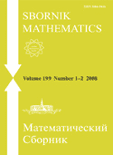
SBORNIK MATHEMATICS
Exploring Innovative Insights in MathematicsSBORNIK MATHEMATICS is a distinguished journal dedicated to advancing research in the field of mathematics, particularly focusing on areas such as algebra and number theory. Published by the esteemed Steklov Mathematical Institute of the Russian Academy of Sciences, this journal has been a prominent platform for scholarly communication since its inception in 1993 and continues to thrive with contributions of significant relevance through 2024. The journal maintains a Q2 ranking in both the algebra and number theory category as well as in miscellaneous mathematics, highlighting its competitive standing in the mathematical community. While it is not an open-access publication, it offers critical insights and innovative research that are vital for mathematicians, researchers, and students alike. With an ISSN of 1064-5616 and an E-ISSN of 1468-4802, SBORNIK MATHEMATICS serves as a crucial resource for anyone looking to deepen their understanding of contemporary mathematical developments.

Revista de la Real Academia de Ciencias Exactas Fisicas y Naturales Serie A-Matematicas
Connecting Scholars through Cutting-edge Mathematical ResearchRevista de la Real Academia de Ciencias Exactas Fisicas y Naturales Serie A-Matematicas, published by SPRINGER-VERLAG ITALIA SRL, is a premier academic journal based in Italy that serves as a significant platform for researchers and practitioners in the fields of Mathematics. With a focus on core areas such as Algebra, Analysis, Applied Mathematics, Computational Mathematics, and Geometry and Topology, this journal boasts an impressive performance in academic rankings, achieving Q1 status in multiple categories, reflecting its excellence in disseminating high-quality research. The journal is easily accessible through subscription options and provides a vital resource for the mathematics community, fostering the exploration of innovative ideas and methodologies. The journal’s commitment to advancing mathematical knowledge is evident through its competitive Scopus rankings, including a remarkable rank of #1 in Algebra and Number Theory, placing it in the top percentile of its field. Scholars and students alike will find in this publication a rich source of impactful research that not only contributes to the academic discourse but also enhances the practical applications of mathematics in today's society.

TRANSACTIONS OF THE AMERICAN MATHEMATICAL SOCIETY
Pioneering Research in Applied and Theoretical MathematicsTRANSACTIONS OF THE AMERICAN MATHEMATICAL SOCIETY, published by the American Mathematical Society, is a premier journal in the field of mathematics that has been contributing to the advancement of mathematical knowledge since 1900. With an ISSN of 0002-9947 and an E-ISSN of 1088-6850, this journal holds a prestigious position in the academic landscape, evidenced by its Q1 rankings in both Applied Mathematics and Miscellaneous Mathematics categories as of 2023. With a Scopus ranking of #97 in General Mathematics and a percentile standing of 75th, the journal is recognized for its rigorous peer-review process and the quality of the research it publishes. Though it does not currently offer open access options, it essentially serves as a vital resource for researchers, professionals, and students seeking critical insights and developments in mathematical theory and applications. The Transactions aim to publish high-quality research articles that foster the exchange and dissemination of ideas, supporting the growth of both theoretical and applied mathematics within the global scholarly community.
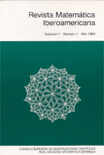
REVISTA MATEMATICA IBEROAMERICANA
Connecting minds, sharing knowledge in mathematics.REVISTA MATEMATICA IBEROAMERICANA, published by the EUROPEAN MATHEMATICAL SOCIETY, is a leading open-access journal dedicated to advancing the field of mathematics. Since its inception in 1996, the journal has provided a platform for high-quality research up to 2024, achieving a prestigious Q1 ranking in the miscellaneous mathematics category and placing it within the top 77th percentile of the Scopus rankings. Based in Spain, this journal fosters a vibrant academic community by disseminating innovative research, theoretical insights, and applications within the broad scope of mathematics. With its commitment to open access established in 2022, REVISTA MATEMATICA IBEROAMERICANA ensures that groundbreaking research is accessible to scholars, practitioners, and students worldwide, emphasizing the importance of collaboration and knowledge sharing in the mathematical sciences. The journal is a vital resource for anyone invested in the evolution of mathematics, providing a rich array of articles that contribute to both the theoretical and applied landscapes of the discipline.